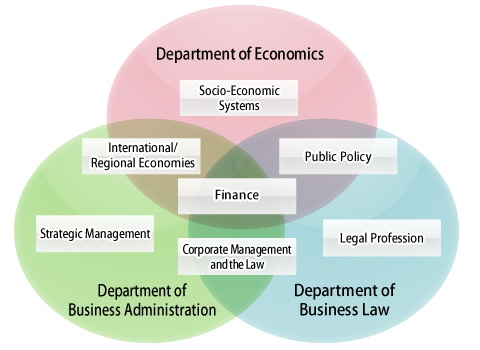Course System
The School of Economics comprises three departments: Department of Economics, Department of Business Administration, and Department of Business Law. Besides them, the day-time course adopts a course system. Students in the day-time course select one course from 4 courses when they move up to the second year. The following is basic information regarding each course's characteristics and class subjects, which you have to know for choosing courses. To avoid selecting a course that does not match your needs, please read this information carefully, including what you have to study in the first year for taking the course you would like to choose.
As a rule, once a course is chosen, it cannot be changed until graduation. Please consider carefully when you make a course selection.
Details of the Course System
Elective courses vary depending on the department. You can select one course from 4 courses in the department you belong.

Elective Courses in Department of Economics
- Socio-Economic system
- International /Regional Economies
- Public Policy
- Finance
Elective Courses in Department of Business Admission
- Strategic Management
- International/Regional Economies
- Corporate Management and the Law
- Finance
Elective Courses in Department of Business Law
- Legal Profession
- Corporate Management and the Law
- Public Policy
- Finance
Each course's syllabus provides information about what is required to study in the first year. It may be difficult to select one course at this point, so, it is recommended to decide classes, taking into consideration a couple of alternative courses you will take.
Course List
Socio-Economic System
Based on economic theories, experts in socio science fields, such as history, politics, sociology and environment, welfare, medical service, and labor, give lectures on methods and mindsets for having proper perspectives on light and dark sides of the modern society by reflecting students' interests in their lectures.
Strategic Management
This course covers essential subjects for cultivating and acquiring problem-solving capabilities in various business scenes in systematic and cross-disciplinary manner. Students can deepen understanding of current and future business trend by completing this course.
Legal Profession
In this course, jurisprudence is lectured in a Comprehensive and systematic way. Students can acquire a legal mindset through studies on six basic fields of law (Constitution, Civil Law, Criminal Law, Commercial Law, Civil Procedure, and Criminal Procedure), basic legal concepts and related legal subjects, as well as a variety of legal approaches.
International / Regional Economies
The goal of this course is to study relations between local societies and enterprises, the current situation and background of global companies, and to understand interdependence between regional/international economies and business. In terms of economics, industrial and economic characteristics of Japan and neighboring countries, and their relations are also lectured. In terms of business administration, business activities of globalized companies are analyzed, focusing on their business strategies, organizations and administrations.
Public Policy
This course offers lectures on a variety of public policies and activities implemented by the central and local governments. Their decision-making processes and impact on societies and economies are also lectured. From economics point of view, purposes, contents and methods of public policies are studied. From a legal point of view, systems regarding policy implementation and governmental administrative are studied.
Corporate Management and the Law
This course is aimed at studying business administration, accounting, and commerce, which are major subjects in the business field, and main legal subjects regarding business management (Commercial Law, Civil Law, Economic Law, International Civil Procedure Code, Labor Law, and Tax Law) in good balance. Laws can not only protect, but also restrict business activities. Therefore, students can deeply understand corporate management by enhancing their understanding of laws.
Finance
In current dynamic times, money cross the time and borders, and , are invested in individuals, enterprises, and public organizations, which may bring a bright future to every individual and society. In this course, money is dealt in a direct manner and practical studies on financial mechanisms, approaches and systems in the real world are offered.
Credit Requirement for Graduation
One of the requirements for graduation is to earn 70 or more credits of major (elective) subjects.
The 70 credits must include:
* 36 or more credits of core studies from your department
* 40 or more credits of compulsory subjects from your course
Your department' subjects don't necessarily correspond to the compulsory subjects of the course you will take. In addition, subjects of other departments can be compulsory subjects of the course you will take. This is rather complicated, so, calculate the number of credits you must earn with a great care.
Course Guidance
For a better course selection, course guidance is held in July and December for freshmen. Be sure to attend the guidance in which the latest information not included in the syllabus and additional instructions about what to study during the first year are given. Freshmen have to select a course at the end of the second semester and submit a statement of reasons to be examined. Basically, everyone can take the course he/she wants to. However, in some cases, school staff may give advice to change a course application, or instruct to rewrite a submitted statement of reasons if it is not written well. Details will be given in the Course Guidance in December (tentative).
Inquiries
As for credits and class enrollment, please contact the School of Economics Support Group (Academic and Student Affairs Section). As for the course system, please put your question into the question box at the School of Economics Support Group, or contact the person in charge of the program in your department.